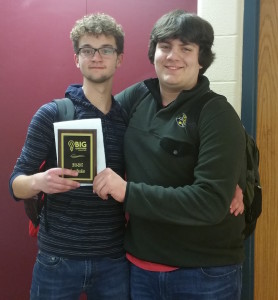

By Chloe Brown
Panther’s Tale
Sophomore Madison Hoag has been in debate and forensics for two years. She believes Big Question Debate is a good event for those considering joining debate.
“I think anyone who is on the fence of joining debate should try this out first. It’s an easier version of debate to help ease you into it,” Hoag said. “It’s different from debate because it’s not as much work and not in depth about politics.”
On March 14, Derby hosted its own Big Question Debate. According to the National Speech and Debate Association (NSDA) website, “Big Questions is a debate format supported by a grant from the John Templeton Foundation.”
Although Hoag said Big Question Debate is easier than policy debate, Hoag also said that structure of the two is similar.
Big Question Debate can consist of teams with either one or two people, but Derby’s tournament only had teams of two. The resolution debated on was “Science leaves no room for free will.”
“It’s not as open of a topic as forensics is,” Hoag said. “I like how it was not about politics at all, but I didn’t like how it was a topic that I think a lot of people have a strong opinion about.”
Participants that are not in debate or forensics saw the topic as a learning experience.
“My views definitely changed based on the evidence I provided when debating,” freshman Skylar Rivera said.
Sophomore Amanda Drouhard added: “I liked that we were all going off the same speeches so we could hear many different opinions on the same information and see how other people looked at it differently.”
Teams debated on both the affirmative and negative side depending on each round. There were three rounds, which were followed by semifinals and finals.
Derby junior Noah Graham and Wichita East senior Cole Gunter won first place. East sophomores Justin Real and Noah Yust placed second, while Derby juniors Alec Hinecker and Ethan Foster and Mulvane’s E.N. Hackerott and junior Aidyn Travis tied for third.
Forty people competed. While other schools also competed, the majority of participants were Derby students. However, participants did not require any debate or forensics experience. Teams varied from those with experience, those without, and a mixture of both.
“I am glad that I now have a bit of experience with debate because know I know that I do not enjoy it,” Rivera said. “I liked how it was set up but I didn’t like how long it took.”
Drouhard added: “I appreciated people stressing that this was just for fun, and how it created an environment for people like me who are not in debate to try it out.”


